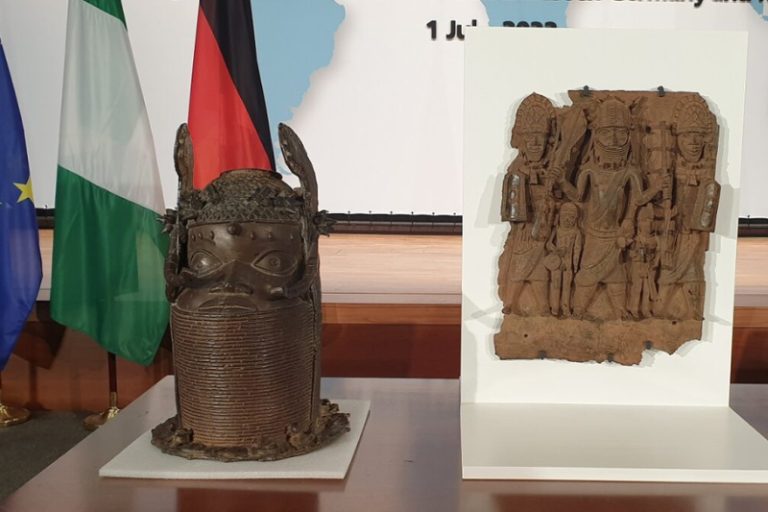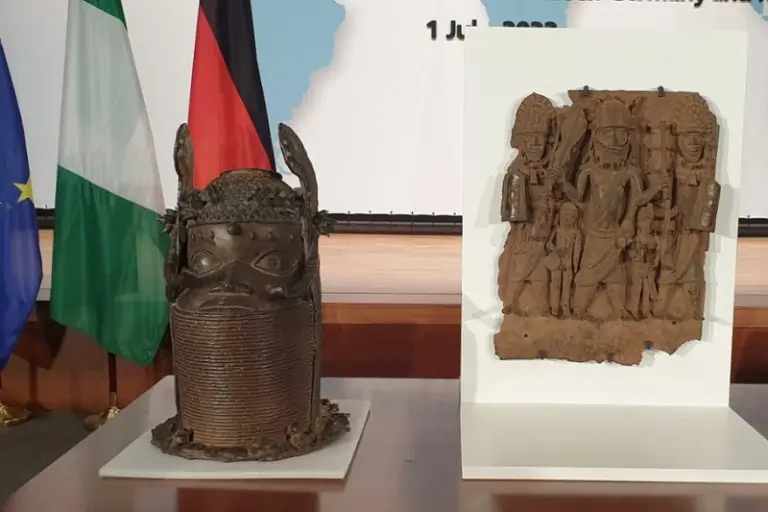

the plight of african artefacts a call for restitution and cultural equity
The world’s most prestigious museums boast collections primarily consisting of African artefacts looted during the colonial era. With less than one percent of these treasures returning to Africa, the continent’s cultural heritage remains largely scattered across Western institutions. The French government commissioned a report that revealed between 90% and 95% of Africa’s material cultural legacy resides outside its borders, serving as a stark reminder of colonial exploitation and plunder.
Britain’s punitive expeditions during its colonial reign led to the seizure of approximately 70,000 African artefacts, including the infamous Benin Bronzes looted during the Benin Punitive Expedition of 1897. Similarly, the German Empire, albeit with a shorter colonial tenure, engaged in looting Africa’s cultural heritage. Notable examples include the acquisition of art from Cameroon and Namibia, which is often obtained through war crimes and forceful seizures.
European interest in African art surged during the fin de siècle era, yet colonial powers labelled these treasures as “primitive,” perpetuating derogatory stereotypes. Colonial narratives overshadowed the cultural significance of these artefacts, reflecting the spirituality and heritage of diverse African ethnic groups. Despite claims of preserving African art for scientific study, museums and private collectors exploited these objects for personal gain, further marginalising African voices.
Africa’s long-term development plan, Agenda 2063, prioritises the protection of cultural heritage and mandates the return of all African cultural property by 2025. However, the road to restitution is fraught with challenges, as European legislation often obstructs the return of national heritage. Although France’s recent efforts to initiate restitution processes, such as returning artefacts to Benin and Senegal, are a small step forward, there is still a significant amount of work ahead.
Germany’s restitution efforts, particularly regarding the return of Benin Bronzes to Nigeria, have garnered attention. While lauded for returning some artefacts, scepticism remains regarding Germany’s true intentions. Critics argue that restitution initiatives serve as a mere facade for expanding influence in Africa, emphasising the need for genuine commitment to equitable cultural preservation.
Civil society initiatives such as the Open Restitution Africa project and African Digital Heritage play a crucial role in monitoring and advocating for the return of Africa’s cultural heritage. These organizations strive to ensure transparency and accountability in the restitution process, ensuring that African voices are heard and respected.
Restitution of Africa’s cultural heritage is not merely a legal or political matter but a moral imperative. These artefacts hold immense cultural significance, reflecting the identity and spirituality of diverse African communities. Returning stolen art pieces is a step towards rectifying historical injustices and promoting cultural equity and preservation.
Decolonization requires empowering Africa to reclaim its cultural heritage and assert its sovereignty over its own narrative. Restitution of looted artefacts is a fundamental aspect of this process, signalling a shift towards equity and recognition of Africa’s rich cultural legacy. It is time for Europe to acknowledge its colonial past and actively support African nations in reclaiming their heritage.
As Africa continues to assert its sovereignty and demand the restitution of its cultural heritage, the path forward lies in upholding cultural equity and recognising the intrinsic value of African art. Restitution is not merely about returning stolen artefacts but also acknowledging the agency and dignity of African nations and their rightful place in shaping global cultural discourse. Through collaborative efforts and a genuine commitment to justice, the restitution of Africa’s looted artefacts can serve as a beacon of hope for a more equitable and inclusive world.
Canadian companies have expanded their presence as major African mining stakeholders and invested more than $37 billion. Africa holds the…
The South African government wants people to plant one million trees across the nation within a single day on September…
The government's statistics regulator showed that South African inflation stayed at 3.2% during February and rose below the projected 3.3%.…
Keywords: Cape Town, African Energy Chamber, Africa, The 2025 African Energy Week (AEW) will host the top energy leaders from…
Recent research shows that Professor Abdessamad Faik believes Africa is at an important energy choice point as renewable-powered hydrogen allows…
The United States plans to shut down its Johannesburg consulate after Sandton Drive gets renamed to Leila Khaled Drive even…
This website uses cookies.